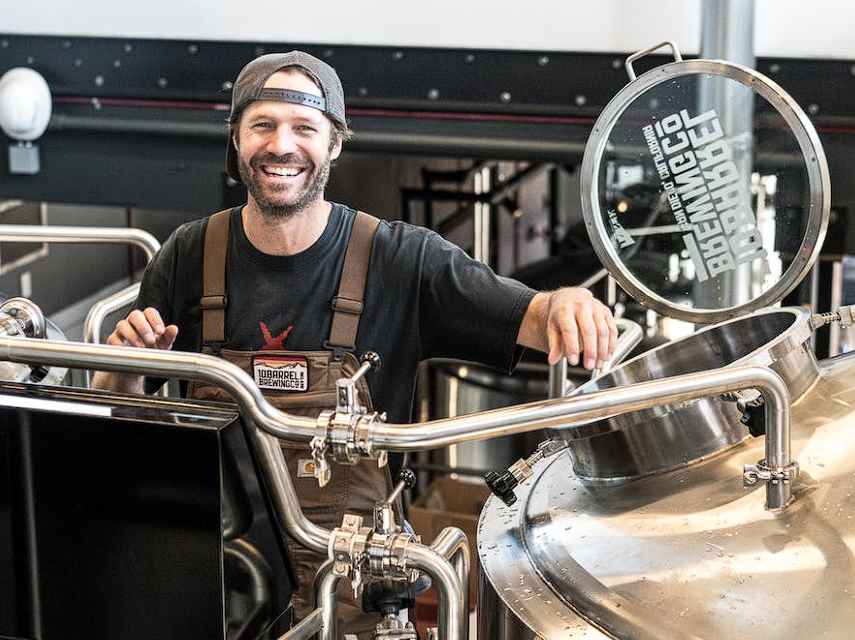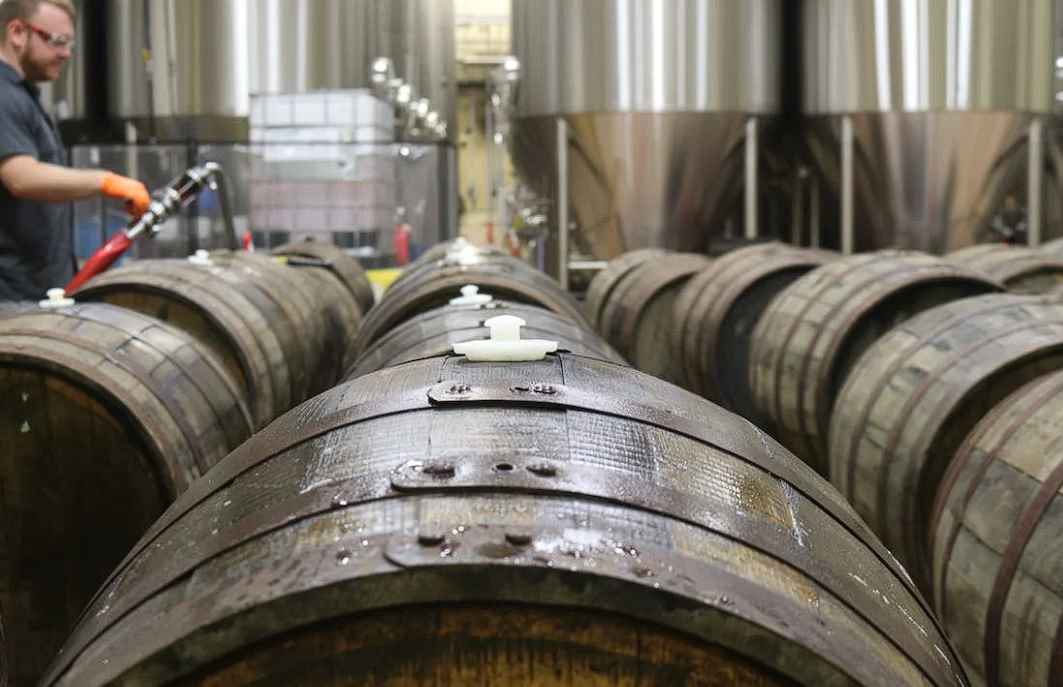For beer-lovers and craft brewers alike, having the right tools for the job makes all the difference. Brewing is a delicate process that requires precision and attention to detail – from mashing grain to tasting your final product – how you measure and monitor these stages can drastically affect the quality of your brews.
But with so many types of brewing gear available, it can be difficult to know what is essential to have on hand. In this article, we’ll discuss some of the most common tools used by brewers both big and small so that you can build up your very own brewery supply kit!
Breweries that simultaneously operate as restaurants, serving as a destination for beer flights and meals, require a separate set of kitchen and dining appliances. Use this advice as a starting point as you develop your brewery's business plan and allocate funds for necessary restaurant and brewery equipment.
Whether you're a beer lover or a spirit enthusiast, we've got something special waiting for you at Tar Barrel – guaranteed to tantalize your taste buds.
Things to Consider When Purchasing Brewing Supplies
The prosperity of your brewery depends on your ability to invest in high-quality machinery. Make a list of all the equipment you'll need and prioritise the items.
Quality
Brewery equipment quality can have a significant effect on the final product's flavour and the brewery's bottom line. Pick sturdy machinery by doing your homework before making any big purchases. Think about who will be responsible for equipment upkeep and how experienced they are in fixing things.
Space
Space constraints mean you can only serve as many customers as your brewery, bar, or kitchen can accommodate. Breweries sometimes use massive warehouse spaces to facilitate the brewing of massive quantities of beer. Think about how much room you'll need for a restaurant or kitchen and where the cooks and bartenders will need to work.
Organising Your Cooking Space
To maximise the effectiveness of your brewery's area, you should seek the advice of a professional kitchen planner. The perfect location is convenient for consumers and workers alike so that your company may function at its highest level of effectiveness.
Effective Maintenance and Operation
Brewery equipment made of stainless steel will last many years if correctly cared for. You could get to know a local expert maintenance specialist. Having some knowledge of routine equipment upkeep and cleaning is also helpful.
Suppliers
To obtain premium lines of commercial equipment in near-wholesale pricing, many cities and towns offer local restaurant supply businesses, which, for a membership fee, are available. Top-notch vendors typically also provide set-up, upkeep, and repair services. Obtaining the necessary tools is an essential first step.
Once you've created a detailed list and a mental picture of your finished bar, it's time to start looking for supplies. You can get affordable restaurant supplies at local wholesalers, lease from a trustworthy internet vendor, or rent necessities like stoves and refrigerators until you can afford to buy them outright.
Do some digging to find a brewery supply store near you and contact them to see whether they can outfit your company. If you're only able to find a small-scale brewing equipment supplier in your area, a local hobby brewers supply shop can help you find one that serves commercial operations.
Comparison between Brand-New and Pre-Owned Machinery
While it's tempting to go with the shiny new option, consider purchasing second hand equipment. Finding a well-maintained stove or deep freezer will save you money both now and in the long run, so it's worth looking for one. However, make sure you're purchasing from a reliable source, and inquire amongst your peers whether they prefer purchasing new or used.
Pricing
Brewery equipment prices will probably be similar from one retailer to the next. However, before making any large purchases, it's always wise to do comparison shopping to be sure you're receiving the best deal possible.
Subsidising or Renting
Equipment financing or leasing might help you launch your firm with less financial commitment and more confidence in the viability of your business concept.
Tools And Materials Required To Start A Brewery
Opening a brewery from the ground up could be the ultimate goal for dedicated craft beer drinkers. Sharing a tasty craft beer with good company is easy. Creating homemade beers is a hobby for many individuals.
Obtain Appropriate Tools
Numerous variables contribute to the overall price of breweries' worth of equipment. Consider the means of the beer information in deciding between new and used brewing equipment. Brewery equipment costs will vary depending on the size, durability, and substance of the machines you need to stock your brewery. A company's initial capital investment usually dictates the kind of machinery it can afford to purchase.
The Evolution of a Craft Brewing Passion into a Business
Transitioning from a home brewing operation to a successful commercial craft beer operation takes time and effort. If you want to start a business, you need to put in the time and effort and have access to substantial capital. To get started, you'll need access to a lot of gear and the know-how and storage space to store and use all that gear. Not to mention, there are legal and licensing concerns in the beer industry that must be considered.
Choosing a Filtering Method
It would be best if you decided which of the many available filtration technological devices is best for your project. Candle filters and plate filters are the most common types of filtration equipment.
When it comes to filters, plate filters are the most cost-effective. A plate filter consists of a stack of cloth-covered, vertical plates set in empty frames at a right angle to one another. The yeast-free beer is poured into the frames, where the cloth catches the particles, and the liquid is redirected to the tubes.
Large brewers often use candle filters in addition to other methods. A candle filter has small holes and employs hollow, circular tubes. Combine the beer and diatomaceous earth, then transfer the mixture to the storage container. The beer in this container can be filtered using the filter to remove unwanted particles.
What Brewery Equipment Is Necessary?
Beer brewing is labour-intensive, primarily when catering to a large audience.
If you want to open your brewhouse, you will require a great deal of support, whether you're a complete novice who needs to learn how to produce beer from scratch or a master brewer who wants to bring your home-brewed masterpiece to the next level at a craft brewery.
- Malting House
- A filtration system
- Reverse-flow heat pump
- Either a hydrometer or a refractometer
- Tank with a lot of light
- Pumps
- Valves
- Warehouse Hardware
- Kegs
- Equipment for packaging
- Brewhouse
You're in luck; you're not the only person who enjoys brewing beer, and the market is stocked with thousands of different brands and pieces of equipment. Although only some pieces of equipment used in a brewery are required to make high-quality beer, a few essential elements should be included in each brewery's business plan.
Frequently Asked Questions
A brewer makes beer in a craft brewery, pub, or lab. Daily duties include tasting beer samples, selecting beer ingredients, tracking sales, and devising marketing plans. You need to know a lot about the beer industry and be able to delegate tasks in the brewing process. Brewers usually work on a team.
A brewing system includes a heat source, boiling tank, and fermentation tank for the various stages of the brewing process.
Most breweries use a steam-fired kettle, which uses steam jackets in the kettle to boil the wort. Breweries usually have a boiling unit either inside or outside of the kettle, usually a tall, thin cylinder with vertical tubes through which wort is pumped.
But what you may be surprised to hear is that EVERY beer starts off with the same foundation of four essential ingredients which includes hops, barley, yeast, and of course, water! By adding other extracts and adjuncts to the recipe, beer can take on many different flavour profiles.
The brewing itself requires attention to detail, maths, chemistry and being able to focus on precise measurements and recipes, while also dealing with supplies, inventory, accounting, and managing the rest of the employees and issues that arise when running any business.
Conclusion
From milling grain to sampling the finished product, it's important to have the proper equipment. The quality of your brews will depend critically on how well you measure and track these processes. Here are some of the most popular items used by breweries of all sizes to equip their own brewhouses. To maximise productivity, your business needs a spot that is convenient for both customers and employees. Get the help of a professional kitchen designer to make the most of your brewery's space.
The best suppliers usually also offer maintenance and fixing services. To get your business up and running, you need certain tools, and once you know what those tools are, you can go out and get them. Local wholesalers, reputable online vendors, and short-term rentals of major appliances like stoves and refrigerators are all good options until you can save up enough money to buy them altogether. To check if they can furnish your business, call a local brewery supply store. Brewery equipment costs can vary widely depending on a wide range of factors.
Before picking between brand-new and pre-owned brewing equipment, think about how you intend to get your hands on beer knowledge. In most cases, the type of equipment a firm can buy depends on the amount of money it has available at the outset. The beer sector has its own set of legal and licensing considerations. Plate filters are the most cost-efficient option when filtering beer. Aside from hollow, circular tubes and diatomaceous earth, candle filters are frequently used by large breweries. While only a few pieces of equipment are strictly necessary to brew beer, any brewery's business strategy should cover the basics.
Content Summary
- Beer enthusiasts and craft brewers alike can benefit greatly from high-quality equipment.
- Measuring and monitoring the many steps of brewing, from mashing grain to tasting the final product, is an intricate process that has a profound impact on the end product's quality.
- Since there are many options for brewing equipment, it might be confusing to choose what you really need.
- Here, we'll go through some of the most popular brewing equipment used by breweries of all sizes so you can put together your own toolkit!
- Breweries that double as restaurants, drawing customers for beer flights and full meals, must have a dedicated set of cooking and serving equipment.
- Start with this information as you create a business plan for your brewery and budget for the essential restaurant and brewing equipment.
- Your ability to purchase new, high-quality equipment is crucial to the success of your brewery.
- Create a list of everything you'll need and rank it in order of importance.
- The taste of the finished product and the brewery's bottom line can be significantly impacted by the quality of the brewery's equipment.
- Do your research before investing in expensive equipment so that you may be sure to get what you need.
- Determine who will be in charge of equipment upkeep and how much experience they have maintaining certain items.
- Due to limited quarters, you can only serve as many patrons as your bar, restaurant, or tavern can accommodate.
- Breweries would often rent out huge warehouses to accommodate the production of vast volumes of beer.
- Take into account the space required for the kitchen and the bar, as well as the needs of the staff who will be working in these areas.
- Get the help of a professional kitchen designer to make the most of your brewery's space.
- To maximise productivity, your business needs a spot that is convenient for both customers and employees.
- Stainless steel brewing equipment has a long lifespan with proper maintenance.
- A local expert in maintenance might be someone you could get to know.
- It's also helpful to have some experience with regular equipment maintenance and cleaning.
- Many cities and towns have local restaurant supply businesses that, for a membership fee, provide access to premium lines of commercial equipment at prices close to those offered by wholesalers.
- The best suppliers usually also offer maintenance and fixing services.
- The first step is to get your hands on the equipment you'll need.
- After making a thorough list and visualising the final product in your mind, you may begin shopping for ingredients.
- Local wholesalers, reputable online vendors, and short-term rentals of major appliances like stoves and refrigerators are all good options until you can save up enough money to buy them altogether.
- To check if they can furnish your business, call a local brewery supply store.
- If you live in an area without access to a commercial brewing equipment source, consult a hobby brewers supply store for recommendations.
- You could buy brand new equipment, but think about getting used ones instead.
- You can save a lot of money in the long run if you can find a stove or deep freezer that has been carefully taken care of.
- Make sure you're buying from a trustworthy vendor, and check with your contemporaries to see if they prefer to buy new or pre-owned.
- The cost of breweries' worth of equipment is probably going to be consistent no matter where you shop.
- Of course, before making any major purchases, it's always smart to conduct some comparison shopping to be sure you're getting the greatest bargain.
- You can test the waters of business ownership with less risk and a smaller initial investment by financing or leasing equipment through a subsidy or rental programme.
- True craft beer enthusiasts may see starting their own brewery as the pinnacle of achievement.
- It's simple to bond with a group of friends over a refreshing craft beer.
- Many people like making their own beers as a hobby.
- The final cost of a brewery's tools depends on a wide range of factors.
- Before picking between brand-new and pre-owned brewing equipment, think about how you intend to get your hands on beer knowledge.
- The size, durability, and content of the machines you need to outfit your brewery will determine how much money you will need to start a brewery.
- In most cases, the type of equipment a firm can buy depends on the amount of money it has available at the outset.
- Making the leap from homebrewing to a thriving commercial craft beer enterprise is no easy task.
- Starting a business requires significant time and money.
- In order to get started, you will need access to a large quantity of equipment, as well as the knowledge and room to properly store and utilise this quantity of equipment.
- There are also licensing and legal issues in the beer business to think about.
- Picking the right filtering technology from the many options available is essential for the success of your project.
- The most prevalent filtration devices are candle filters and plate filters.
- Plate filters are the cheapest type of filter available.
- A plate filter is made up of a series of cloth-covered, vertical plates mounted in blank frames at right angles to one another.
- Pouring yeastless beer into the frames, the cloth strains out the solids and channels the liquid into the tubes.
- In addition to other processes, large breweries frequently use candle filters.
- There are many tiny holes in candle filters, which are made from round, hollow tubes.
- Beer and diatomaceous earth should be mixed together before being transferred to the container for long-term storage.
- This container's beer can be filtered to eliminate sediment using the filter.
- Brewing beer is a labour-intensive process, particularly for large-scale production.
- Whether you are a total beginner who needs to learn how to manufacture beer from the start or a master brewer who wants to take your home-brewed masterpiece to the next level at a craft brewery, you will want a great deal of support if you want to open your brewhouse.
- Filtering apparatus, a heat pump that operates in reverse Fermentation is an integral part of making beer.
- A few key features should be included in any brewery's business plan, even if just a subset of the equipment utilised in a brewery is required to produce high-quality beer.


